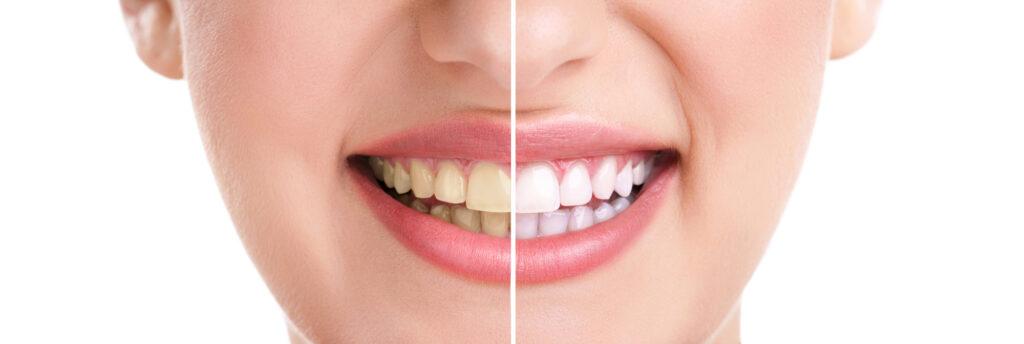Teeth Whitening

Teeth Whitening
Hydrogen peroxide is used in teeth whitening treatments to eliminate stains and discoloration caused by smoking, coffee, poor oral care, aging, and other factors. This procedure can be completed in your dentist’s office or at home, with the use of trays given by your dentist or over-the-counter (OTC) solutions such as whitening strips. We explain how tooth whitening works and compare the most common solutions here.

Demerits of Tooth Whitening
- Teeth sensitivity can be caused after teeth whitening, particularly within the first 48 hours after treatment.
- Because whitening treatments do not work on crowns or fillings, your results may be spotty if you have a lot of dental work. Get professional whitening done before any dental procedure if it's possible.
- Teeth whitening works better for some people than for others. Teeth whitening is similar to how some people's skin tans better than others.
People having good oral health, notably healthy teeth, and gums, are likely to be suitable candidates for teeth whitening. You are more likely to respond to treatment if your teeth appear yellow.
If you have any of the following conditions, you may avoid getting your teeth whitened professionally:
- You’re carrying or breastfeeding a child.
- Having extremely sensitive teeth.
- Periodontal disease, cavities, or exposed roots are evident.
A patch test should also be performed by your provider to confirm that you are not allergic to the bleaching substance used.
Certain dental restorative treatments might have an effect on the overall quality of whitening. Because fillings, implants, crowns, and bridges do not whiten like natural teeth, you may end up with an uneven hue. Your dentist can devise a plan to offer you with consistent whitening, which may include new fillings or crowns in a brighter color.
Because OTC whitening toothpaste and rinses are so light, almost anybody, even children, can use them. Dentists advise children to use only a pea-sized quantity of toothpaste while under parental supervision. They should not consume or drink either product since it will cause stomach distress.
In-office teeth whitening procedures are regarded as safe, particularly because they’d be delivered or supervised by a trained dentist. Nevertheless, if your teeth or gums are exceptionally sensitive, the whitening procedure (even at-home whitening gels) might be uncomfortable. Since our teeth are porous, whitening treatments go below the surface of the tooth and dehydrate it.
Avoid extremely hot or cold meals for the first 24 hours after professional whitening to reduce sensitivity. The gums may sometimes seem discolored following treatment, although they normally fade within a day or two.
The kind of teeth whiteners you use will determine the duration of your results. Expert whitening treatments produce rapid benefits that often last a year, if not longer, before requiring maintenance treatment. Qualified at-home remedies (trays and gels) require many weeks to provide the desired effects. Then, once a year, you may re-whiten by going through the same at-home procedure again.
Reducing food and drinks that are prone to stain or eating them in moderate quantities (e.g., drinking less coffee and red wine) can help you get longer-lasting benefits. The more you look after your teeth following a tooth whitening, the longer the benefits will remain.
Just about everyone notices the treatment’s initial effects. Teeth whitening, on the other hand, maybe more successful on certain people than on others. With a comprehensive brief screening, including a tooth shade evaluation, we can verify if you are a suitable candidate for teeth whitening.
We appreciate your requirements and focus on the greatest quality when it comes to whitening your teeth with the most up-to-date technology. We provide outstanding professional whitening procedures. Our teeth whitening treatment guarantees that your teeth will look great after just one session!
